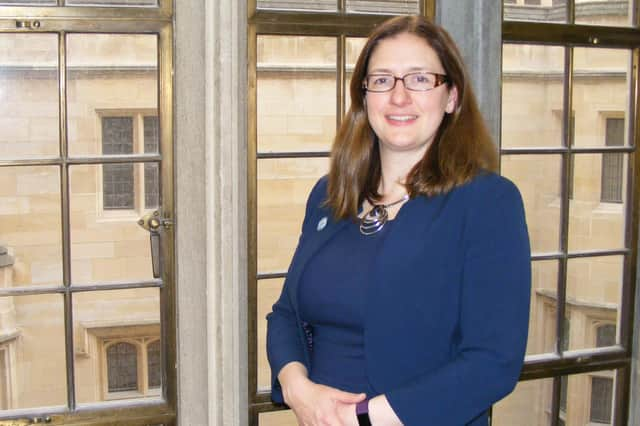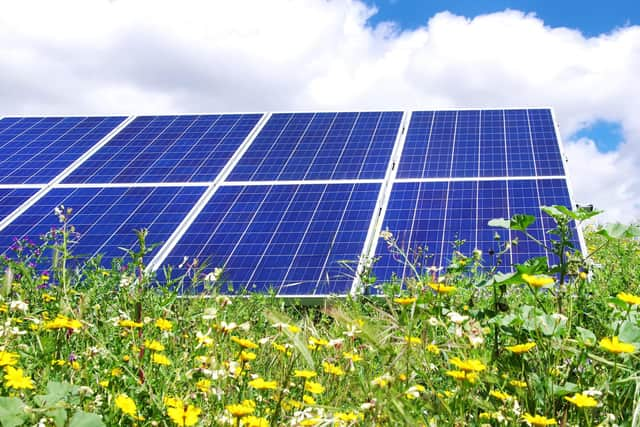MP voices objections to local large-scale solar farms applications in significant Parliamentary debate


Dr Caroline Johnson was able to table a Parliamentary debate in Westminster Hall, supported by other backbench MPs, on the issue of large-scale solar farms.
At the Backbench Business Committee, Dr Johnson raised concerns about the four major applications in her constituency, highlighting many residents’ fears of the sheer scale of the proposals, the impact this will have on Lincolnshire’s good farmland and wider issues of food security.
Advertisement
Hide AdAdvertisement
Hide AdCovering thousands of acres, the four applications in Dr Johnson’s constituency are Springwell Solar Farm (located southwest of Metheringham), Fosse Green Solar Farm (between Bassingham, Witham St Hughs and Thorpe on the Hill), Beacon Fen (North of Ewerby) and Heckington Fen.


The debate also heard from other Lincolnshire MPs Sir John Hayes, MP for South Holland and the Deepings, and Sir Edward Leigh, MP for Gainsborough, as well as Newark MP Robert Jenrick among many others from across the country detailing applications in their constituencies on a similar scale.
During her speech, Dr Johnson highlighted how large-scale solar projects have threatened to swallow up rural areas with applications over the past few years. She stated that these projects disproportionately affect the most fertile parts of the UK, including Lincolnshire which alone produces 30 per cent of the UK’s vegetables. She also made clear in the debate that developers should not have land grades analysed themselves due to potential incentives to be able to report a lower grade of land in this context.
Community opposition featured heavily in the debate, highlighting over 2,000 handwritten responses which Dr Johnson received from her recent constituency survey. Ninety per cent of respondents said they were concerned about the enormous scale of the proposals.
Advertisement
Hide AdAdvertisement
Hide AdDr Johnson said: “During my large-scale solar farms debate in Parliament, I highlighted how the concerns about these local proposals in our area of Lincolnshire are deeply felt and widespread. This is not about the small pockets of solar farms on land of poor agricultural value, but about the sheer scale of current proposals to cover thousands of acres of prime farmland.
“Solar energy is a piece of the jigsaw in our transition to a greener future, but we must strike a balance.”
She went on: “I am grateful to Minister Bowie from the Department for Energy Security and Net Zero for his attendance in the debate and his confirmation that a solar plan will be published imminently. I will work with him and colleagues to ensure the policies are effective in delivering the Prime Minister’s pledge to not allow great swathes of British countryside to be taken up by solar panels.”
A second stage of consultation on proposals for Springwell Solar Farm with battery storage, which is proposed for land between Metheringham and Ashby de la Launde, took place in January and February this year.
Advertisement
Hide AdAdvertisement
Hide AdNow developers EDF Renewables UK say new research has shown that a majority of people who live in Lincolnshire support new solar farms and the benefits they can bring to communities.
Springwell Solar Farm 800MW project spanning 4,200 acres, would provide enough energy to power over 180,000 homes and is being developed by EDF in partnership with and Luminous Energy.
EDF Renewables UK says research conducted in the period running up to the start of the consultation shows that people living in Lincolnshire support solar farms like Springwell.
According to their findings, the majority of those (77 per cent) who responded to a survey by Survation, conducted on behalf of EDF Renewables, said that they see climate change having an effect on their communities, with 82 per cent of respondents saying that they support the development of solar farms.
Advertisement
Hide AdAdvertisement
Hide AdDuring the latest six-week consultation on proposals for Springwell Solar Farm, 11,835 letters were sent to local homes and businesses, while over 450 people attended events to learn about the proposals.
Although these findings do not seek locals’ views on large-scale solar farm developments, a spokesperson for the project said the survey was on “general attitudes towards different types of renewable energy (including solar) in Lincolnshire.”
She added: “I understand that the debate on Thursday will also draw on survey results which explores general attitudes towards solar energy.
“The research conducted by EDF Renewables is separate from consultation activity undertaken on specific schemes, in this case for Springwell Solar Farm.”
Advertisement
Hide AdAdvertisement
Hide AdResearch for the survey was commissioned by Survation on behalf of EDF Energy. Fieldwork was conducted between November 17 and December 18 2023 and involved online interviews of adults aged 18-plus living in Lincolnshire. The sample size was 1,021, with differential response rates from different demographic groups taken into account.
Matthew Boulton, Director of Solar, Storage and Private Wire at EDF Renewables UK said: “We know that people in Lincolnshire are concerned about climate change, and projects like Springwell are an important part of the solution. If consented, Springwell would make a significant contribution to our country’s future energy supply and security.
“We would like to thank everyone who took the time to share their views with us earlier this year. We are pleased to have received over 200 responses from the community, which will help us refine our proposals before submitting a planning application.
“Feedback from earlier public consultation, along with outputs of early environmental assessments and technical work, has already helped shape proposals for Springwell Solar Farm. Less than half of the site (42 per cent) is currently proposed to be used for generating and storing energy, with the rest of the site (58 per cent) proposed for mitigation, ecological enhancement or retained for agriculture use – including all fields of the highest agricultural quality (solely Grades 1 and 2).”
Advertisement
Hide AdAdvertisement
Hide AdAn application for consent for the Springwell Solar Farm is expected to be submitted to the Government later this year.
Local protestors gathered in their dozens to oppose the plans for Springwell Solar Farm at one of the consultation events in February at Blankney.
Springwell Solar Action Group protestors unanimously said at the time they are not against solar as a means of renewable energy, but would prefer projects utilise rooftop space in a community-wide effort, rather than agricultural farmland.
Marc Williams, 52, said it was the “sheer size of the development” that residents had a problem with.
Advertisement
Hide AdAdvertisement
Hide Ad“They are essentially destroying massive amounts of prime agricultural land for something that produces so little power in comparison to wind turbines.
“The locals are not anti-solar, but they are pro-reasonable solutions, and this has disenfranchised a huge number of people.”
76-year-old resident Michael Credland asked how this would impact wildlife in the area, and how weeds and other growth would be maintained throughout the 40 years of solar farm usage.
“The beauty of the rural countryside is being destroyed,” he argued. “It feels totally political, and residents are having the wool pulled over their eyes. The only thing this will generate is profits.”
